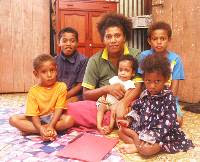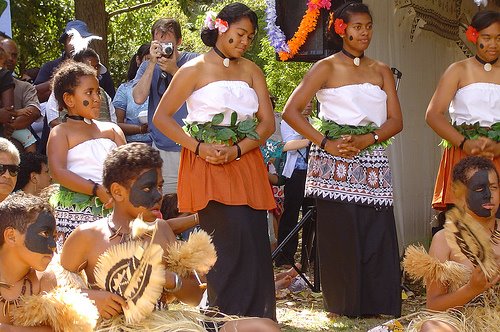
Spurred by a new Pacific Island exchange program,
a team of Gold Coast cardiac surgeons is saving Fijian lives. Peter Gleeson reports. HEART surgeon Doctor Shailesh Khatri has just performed his eighth angioplasty procedure for the day and is about to sit and relax with a cup of tea for the first time in nine hours.
Then the sound of wailing sirens and the unmistakable blaring of an ambulance tells him that his long day may not yet be over. It is Monday this week and sure enough, the patient being wheeled into John Flynn's coronary care unit is having a cardiac arrest.
The 41-year-old has collapsed at the wheel while driving, luckily just a few kilometres from the hospital. As paramedics defibrillate the victim, Dr Khatri gets to work, pumping a special dye into the man's heart in preparation for an angiogram, which immediately reveals a blockage in the patient's major cardiac artery.
Within 15 minutes, Dr Khatri has performed angioplasty surgery, a procedure where a balloon is inserted into the artery, effectively blowing out the plaque which caused the blockage. A stent was then placed into the damaged arterial canal to keep it open.
This was life-saving stuff but all in a day's work for the Fijian-born and Australian-educated Dr Khatri. "I guess you could say I get a lot of job satisfaction,'' said Dr Khatri, who had literally saved this young man's life.
"He will be okay. "He is a heavy smoker. "I don't think he will smoke any more. "I hope not anyway.''
John Flynn Hospital has one of Queensland's best and busiest cardiac units, led by eminent cardiologists Dr Ian Linton and Dr David Cody, supported by Dr Khatri, and they have just embarked upon a project aimed at helping cut the Fijian cardiac mortality rate.
"The mortality rate in Fiji from heart disease is among the highest in the world,'' said Dr Linton, the program's brainchild. "I think there's some genetics there and maybe the more modern lifestyle and foodstuffs, not as much fish in their diet, those sort of things.
"We've been working for more than two years on the project and it is a labour of love for myself and Dr Khatri.'' Dr Linton said he had visited Fiji many times and had 'fallen in love with the people'.
"I got to thinking that in Australia we have these great facilities, we can deal with coronary disease issues and give people longevity, but in Fiji they just don't have that luxury and a lot of people die prematurely,'' he said. Dr Khatri was raised in Fiji before moving to Australia to do his medical degree in Queensland, specialising in cardiac surgery.
He has an affinity with his homeland and when Dr Linton told him of his plans, Dr Khatri was enthusiastic and keen to be involved.
The project, which started last month and was announced by the Fiji Government, delivers the equipment and training for diagnostic services in Suva. The services include coronary angiography, which is the X-ray imaging of the arteries in the heart.
These tests are readily available in Australia, and John Flynn does 2500 a year, but until now they have been beyond the reach of people on Pacific Islands. Fiji's interim Health Minister, Dr Jona Senilagakali, described the establishment of the unit as a major step forward for health care in the country.
John Flynn Hospital has supported the project by helping to provide treatment for Fijians suffering serious heart disease. One of the first patients to undergo an angiogram in Fiji had life-threatening blockages in major coronary arteries.
He was rushed to John Flynn Hospital last week and underwent successful bypass surgery. This week, two other Fijian patients underwent angioplasty, where the narrowed arteries are opened with stents. Much of Fiji's heart-disease problem relates to the increase in animal fats in their diet and the availability of tobacco since World War II.
Associate Professor Rod Jackson, of the University of Auckland, said while western countries were becoming more conscious about eating and smoking habits, the South Pacific Islands were going the other way.
"The result is that while we're conquering heart attacks and strokes, the Pacific Islanders are suffering more,'' said Prof Jackson. In Australia and New Zealand, diets and smoking habits had changed dramatically, said Prof Jackson.
"The major cause of coronary heart disease is eating too much animal fat and smoking. "We are dumping the cheaper cuts of meat, with more fat, on the South Pacific nations. We are doing it with butter as well. "What they need to do is rediscover their local foods and realise that foods being imported from Australia and New Zealand are not good for them.''
For the John Flynn team, education is all part of the process and it will tutor more Fijian doctors on how to perform angiograms, and ultimately, angioplasty. Dr Linton said the ultimate goal was to have a well-established clinic in Suva with trained medics, skilled enough to perform life-saving coronary procedures.
"That is the goal, the aim, and we believe we can school the local doctors into being able to treat people with life-threatening cardiac diseases," he said.
"Right now, they have nothing. It costs $45,000 to send a patient to Australia for bypass operation and that is simply not an option for a poor country such as Fiji.'' There are other charitable organisations in Suva to tackle the problem of coronary heart disease in Fiji, including the establishment of a special foundation, comprising local and New Zealand business professionals.
The Friends of Fiji Heart Foundation aims to send to Fiji medical teams comprising cardiac surgeons, technicians and complex and expensive equipment required to perform bypass surgeries on patients suffering particularly from valvular heart disease.
Valvular heart disease includes the condition commonly known as 'hole in the heart'. This month the foundation sent its first 25-person medical team with equipment and supplies to Fiji, led by Dr Vinod Singh, a consulting physician and trustee.
The team included two cardiac surgeons, three cardiac anaesthetists/intensivists, a cardiologist, technicians and 11 intensive care and clinical care nurses.
Adapted from Fijitimes.com November 15th, 2007
 A man who lost eight fingers while working on a fishing vessel 10 years ago is still waiting for the compensation which was awarded him last year.
A man who lost eight fingers while working on a fishing vessel 10 years ago is still waiting for the compensation which was awarded him last year.





